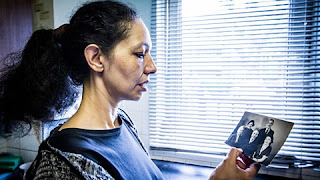This article was originally published in The Courier on 23rd June 2018.
MORTIMER AND
WHITEHOUSE: GONE FISHING: Wednesday, BBC Two
EMMELINE PANKHURST:
THE MAKING OF A MILITANT: Monday, BBC Four
Comedians
Bob Mortimer and Paul Whitehouse have been friends and occasional colleagues for
nearly 30 years. During that time they’ve made an enormous impact on British
comedy. Their legend is secured.
They
also both suffer from heart problems. Paul has had three stents fitted. In 2015,
Bob underwent triple bypass surgery. This frightening experience affected him
deeply.
Devised
by Paul as a form of relaxation therapy for his on-the-mend chum, the six-part
series MORTIMER AND WHITEHOUSE: GONE
FISHING also works as a soothing tonic for the rest of us.
The
premise couldn’t be simpler. Paul, an experienced angler, and Bob, a total
novice, go fishing in some magnificent English lakes. They chat about this and
that, make each other laugh, and occasionally catch some fish (don’t worry,
they throw them back in).
This
could easily come across as dull and self-indulgent if it weren’t for the fact
that Bob and Paul are exceedingly genial and amusing. Spending time in their
company is delightful.
Bob
in particular is one of planet Earth’s most naturally funny and loveable
humans. A world without him doesn’t bear thinking about. My favourite moment in
episode one was when he performed a jaunty little stroll towards his yurt (Bob
takes care of the accommodation). I can’t think of any other living comedian
who could turn such a throwaway bit of business into a thing of joy and beauty.
He’s such a benign vessel of pure silliness.
However,
we get to see another, more contemplative side of him in Gone Fishing. Though primarily light-hearted, there are moments
when the rambling conversation takes a tentative detour into more serious
territory. Bob discussing his life-threatening illness was particularly
poignant.
You
don’t have to be interested in fishing to enjoy this serene series. It’s not
really about that.
As
episode one unfolded, a subtext gradually emerged. There’s more to Gone Fishing than two balding comedians
talking nonsense against a backdrop of glorious scenery. It’s about friendship
and ageing and the way men interact. Whenever their more reflective ruminations
are interrupted by a potential catch, their focus shifts immediately. They’ve
suddenly got more important things to think about than mortality. Men – not all
men – are like that.
Watching
these two old friends, these gifted comics who’ve given us such joy over the
years, in sedentary action is a bittersweet, quietly life-affirming treat.
One
of many programmes shown to commemorate the 100th anniversary of
British women winning the right to vote, EMMELINE
PANKHURST: THE MAKING OF A MILITANT was a brisk yet respectable overview of
how a working mother from Manchester changed the course of history.
Presented
by former Coronation Street actor and
fellow proud Mancunian Sally Lindsay, it put the legendary Suffragette leader’s
achievements in perspective by examining her private life. What made her the woman
she was?
Born
into a liberal activist family, she was aware from an early age that women were
treated as second-class citizens. Her intelligence, compassion, righteous
anger, social conscience and tireless political tenacity were a potent combination.
An
inspirational leader who understood the positive power of negative publicity,
her sometimes violent protests ensured that the issue of female emancipation
became a headline-grabbing, national talking point. The rest, as they say…
This
wasn’t the most in-depth study of one of our greatest national heroes – a hero
who’s only just been commemorated with a statue in Manchester - but it nevertheless
succeeded as a useful introduction to her extraordinary story.




















